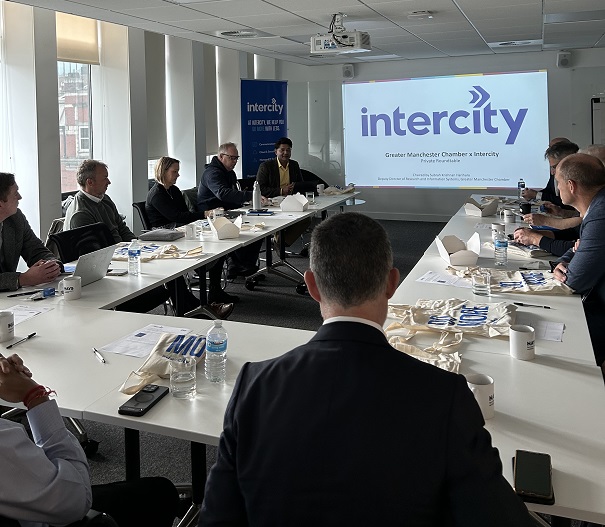
Greater Manchester Chamber recently held a roundtable in partnership with Intercity Technology, an award-winning Managed Services Provider. With the key theme of “Build Smart, Operating Smarter”, the roundtable brought together business leaders from across sectors including manufacturing, construction, education, housing and sport. The discussion was extensive and focused on how organisations are approaching digital transformation, AI adoption, and the opportunities and challenges they face with digital transformation.
Participants shared practical examples of AI and digital adoption across their sectors. In education, AI was already being used for lesson planning. In housing, mobile apps were seen as the most effective way to drive customer self-service and engagement. In sport, AI tools for scouting and contract management are being trialled whereas in manufacturing and construction, the focus was mostly on production planning, IoT and predictive maintenance.
The duality of technology-enabled innovation is a source of frustration to many organisations - while AI and digital technologies present significant opportunities to improve business productivity and resilience, they also introduce new and risks, including cyber security risks. Moreover, technology adoption projects often face many challenges: there are data silos, fragmented system and importantly, cultural barriers. The conversation, therefore, centred on organisational readiness for change and the importance of balancing experimentation with governance.
Leaders from different sectors consistently raised the importance of culture in enabling digital transformation, and resistance to change staff was identified as a significant barrier. Some participants reported that employees were often reluctant to abandon processes they had used for a long time, while others noted a degree of fatigue arising from poor experience with previous technology rollouts.
Strategies to overcome this resistance were discussed. Reassuring staff that technology would not replace jobs – particularly in the context of AI adoption – and building trust through transparency were identified as important. Some organisations had experienced success with select users to become early adopters of new technology and then enabling them to become champions of change. Ultimately, participants emphasised that digital adoption is as much about people and mindsets as it is about technology.
The challenges were not all organisational or cultural. Current IT infrastructure, especially multiple stand-alone systems, led to fragmentation and data silos. The lack of system integration was identified as a major barrier to successful adoption of AI technologies. Furthermore, robust governance and risk management were critical. Without clear policies for cybersecurity controls and guardrails, particularly around AI accountability, there is the risk of data breaches and even the misuse of AI for cyber-attacks.
Many organisations had started off with pilot projects, but such initiatives often failed to demonstrate return on investment, and uneven uptake created disparities in productivity. Another recurring challenge was scaling pilot projects into organisation-wide solutions. As a result, return on investment was a major concern for many organisations. It is, therefore, vital that AI adoption must be tied to business outcomes and integrated with existing technologies rather than ending up being “yet another system”.
In summary, the roundtable highlighted both the promise and complexity of building “smart” organisations. While AI and digital technologies provide numerous opportunities for innovation, efficiency and improving customer value, success depends heavily on culture, leadership, and workforce readiness. Clear business cases and ROI measures are essential to sustaining momentum, while governance and cybersecurity must underpin innovation to ensure resilience and compliance. Building smart and operating smarter is not simply about acquiring new technologies. Rather, it involves creating the agility to identify the ‘best-fit’ technology for business problems and continuous adaptation to thrive in a rapidly changing environment.

